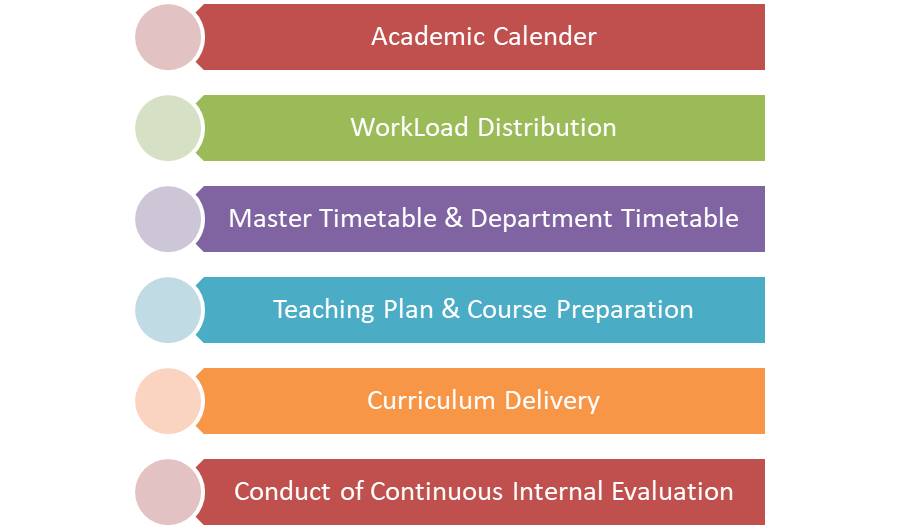Academic Planning
The IQAC of S.N.M College organises “SAHAJA” A Forum for Annual Academic Strategic Planning at the end of May every year to consolidate the insights of faculties regarding Key Performance Indicator of Higher Education. The program SAHAJA is a roadmap for institutional decisions, both long-term and short term and makes sure that decisions and operations: 1) Uphold the institution’s aims, goals and core principles. 2) Follow governmental orders, accrediting organisations’ requirements, etc. 3) Maintain the institution’s operational and financial health throughout the foreseeable future.
Objectives of the programme:
- Discussion for Key Performance Indicator of Higher Education
- Preparation of Academic Calendar
- Finalisation of Departmental Action Plan
- Preparation of Developmental Goals
- Fine Tuning of Systems Programs & Planning
- Addressing policies, NAAC Revisit, Budgeting and Resource Mobilisation
Expected Outcome
- Perspective Academic Plan of the college to be implemented in the corresponding year
Curricular Planning and Implementation
The Principal and all Department Heads make the composition of the SNM College Council, which meets on a regular basis to address matters pertaining to the institution’s academic programmes and college-related activities. In the last week of May, the principal issues a circular to the IQAC instructing them to develop the college’s potential plan for the forthcoming academic year.
The IQAC sends a notice to all department heads prior to the start of the academic year asking them to complete the following and submit it for approval and adoption to the IQAC.
- Integration of the department’s timetable with the master timetable.
- Budget requirements as well as the Strategic Perspective Plans (SPPs: Action Plan) of all Cells and Clubs.
- The teacher’s workload and the requirements for the upcoming academic year.
- Departmental Activities with tentative date of conduct for the academic year
- The syllabus and curriculum for the certification course/Add-on course, the remedial intervention strategies for the courses, and the bridge course.
- The plan for the curriculum, the deployment strategy, and the methods for delivering the curriculum.
A circular from IQAC issues to all committees, cells, and clubs the first week of June urging them to create and submit their perspective plans and plans of action to IQAC the third week of June. When the deadline approaches, departments get together to prepare all the materials requested by the IQAC and submit them for approval. A number of committees, cells, and associations will create own SPPs and budgets, which will then be submitted to the IQAC for approval. The IQAC adopts the SPP, curriculum plan, bridge course syllabus, and budget, among other things, in its Proceedings/Minutes of the Meeting and requests in a circular that the Departments adhere to the Time Table, Curriculum Plan, and Curriculum for Bridge Courses. The college’s Strategic Perspective Plan is combined and created by IQAC based on each department’s SPP and the SPP of each cell, committee, club, and association. The plan is then presented to the college Governing Council for approval at its meetings.
COURSE DELIVERY
- The subject teachers develop Teaching Plans (Theory & Practical) and Tutorial Plans prior to the beginning of each semester as part of the preparation for the delivery of the course. Before the start of the semester, each faculty member submits a unit-wise teaching plan to IQAC.
- All faculty members are responsible for creating the course files, which include the syllabus, academic calendar, teaching plan, tutorial plan, programme outcomes, programme specific outcomes, and course outcomes, as well as assignment questions, university question papers with model solutions, National level competitive examination question papers, and support for academically slow learners.
- The IQAC frequently checks on the effectiveness of the curriculum’s implementation. Through the implementation of lesson plans, faculty members provide updates on the status of the syllabus coverage and course delivery.
- IQAC conducts academic audits at the department and institute levels to confirm the accuracy of course files, evaluation procedures, and laboratory conduct.
- Using direct and indirect evaluation tools, the attainment of COs & POs is determined.
- For students who are struggling academically, remedial classes are offered.
- For students who entered laterally, there are bridge courses available.
- ICT tools and other educational techniques are utilized to ensure that the course is understood effectively.
- Students’ academic feedback is gathered from them based on a variety of criteria in order to enhance the teaching and learning process. Feedback is given to the concerned faculty so they can take the proper corrective action.
- Every subject receives an end-of-course survey from the students, which is used to assess how well they comprehend the material. The course instructing faculty and Head of the Department address student input regarding the portion covering as per the lesson plan and suggestions for improving the teaching and learning process before and after each internal assessment test.
- Assessment and review based on outcomes, comments, and placements at the institutional, programme, and department level. The delivery of the curriculum is improved by an annual external audit.
